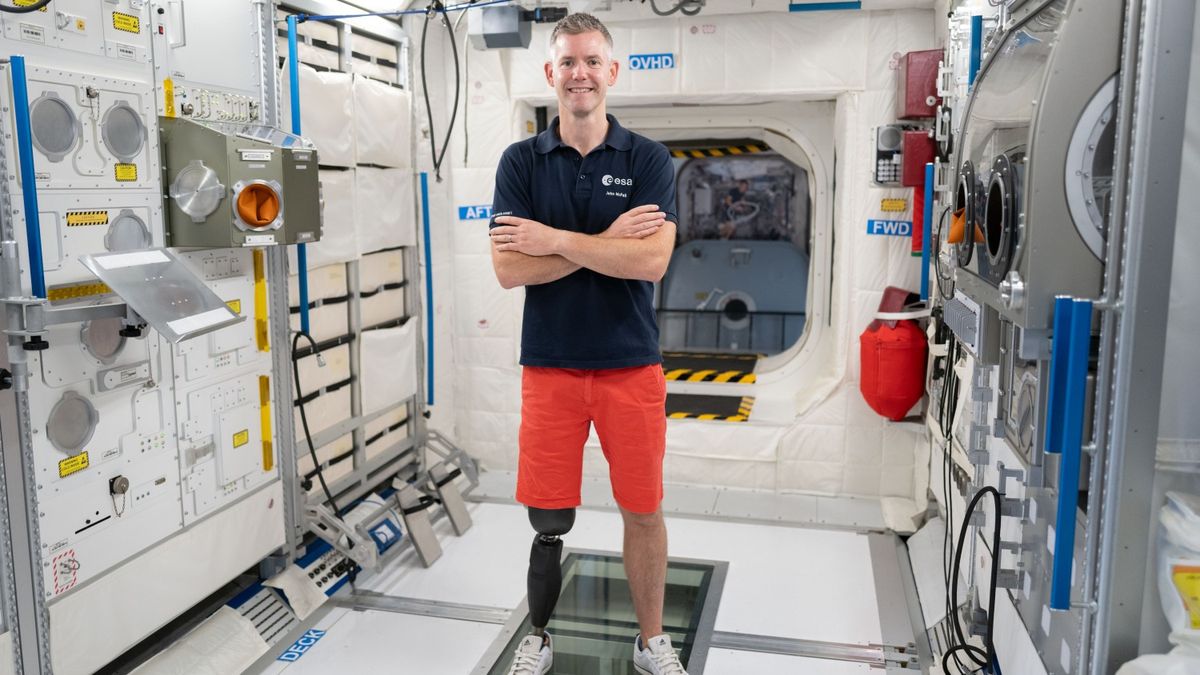In a groundbreaking development, the European Space Agency (ESA) has medically cleared British astronaut John McFall, a former Paralympian with a prosthetic leg, for long-duration missions to the International Space Station (ISS). This historic decision marks a significant milestone in making space exploration more inclusive.
Who is John McFall?
John McFall, 43, hails from Cardiff, UK. At 19, he lost his right leg above the knee due to a motorcycle accident. Demonstrating remarkable resilience, McFall pursued athletics and secured a bronze medal in the 100m sprint at the 2008 Beijing Paralympics. He later transitioned into a medical career, becoming a trauma and orthopaedic surgeon. In 2022, McFall was selected by ESA for a feasibility study aimed at assessing the potential for astronauts with physical disabilities to participate in space missions.
What Did the Feasibility Study Involve?
The ESA’s “Fly! Feasibility” study, initiated in 2022, explored over 80 potential challenges that an astronaut with a disability might face during space missions. This comprehensive assessment examined medical evaluations, the functionality of prosthetic limbs in microgravity, and emergency evacuation procedures from the ISS. The study concluded that a lower limb amputee could safely train for, participate in, and return from long-duration missions as a fully integrated crew member.
What Does This Mean for Space Exploration?
Daniel Neuenschwander, ESA’s Director of Human and Robotic Exploration, emphasized that McFall’s certification represents a historic advancement in broadening access to space. This achievement challenges traditional perceptions of the physical requirements for astronauts and paves the way for more inclusive participation in space exploration. McFall himself expressed pride in this cultural shift, highlighting the importance of assuming capability in individuals with disabilities unless proven otherwise.
When Will McFall Embark on His Mission?
While McFall has been medically certified for spaceflight, he has not yet been assigned to a specific mission. He remains part of ESA’s astronaut reserve, ready for potential future assignments. With the ISS scheduled for decommissioning around 2030, there is a window of opportunity for McFall to participate in a mission before then. Discussions are also ongoing regarding potential involvement in private space missions, such as those organized by Axiom Space.
This landmark decision not only exemplifies human resilience and adaptability but also signifies a transformative moment in space exploration, promoting inclusivity and challenging preconceived notions about the capabilities of individuals with disabilities.
Summary of the news
| Category | Details |
|---|---|
| Why in News? | John McFall, a former Paralympian with a prosthetic leg, becomes the first astronaut with a disability approved for ISS missions. |
| Who is He? | A 43-year-old British athlete-turned-surgeon who lost his leg in a motorcycle accident at 19. |
| ESA’s Initiative | Selected in 2022 for ESA’s “Fly! Feasibility” study to test astronaut capabilities with disabilities. |
| Study Findings | Confirmed that lower-limb amputees can safely operate in microgravity and handle emergency evacuations. |
| Significance | A major step toward inclusivity in space, challenging traditional astronaut selection norms. |
| Current Status | Medically cleared for long-duration space missions but yet to be assigned a flight. |



 17 Year Old Aditya Pandya Becomes India’...
17 Year Old Aditya Pandya Becomes India’...
 New Dragonfly Species Lyriothemis kerale...
New Dragonfly Species Lyriothemis kerale...
 India Just Got Two Mega Telescopes - Her...
India Just Got Two Mega Telescopes - Her...








